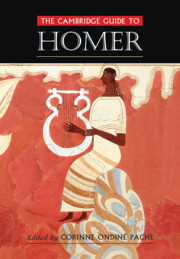Book contents
- The Cambridge Guide to Homer
- The Cambridge Guide to Homer
- Copyright page
- Contents
- Figures
- Notes on the Contributors
- General Introduction
- Part I Homeric Song and Text
- Part II Homeric World
- Part III Homer in the World
- Introduction
- Homer in Antiquity
- Homer and the Latin West in the Middle Ages
- Homer in Greece from the End of Antiquity 1: The Byzantine Reception of Homer and His Export to Other Cultures
- Homer in Greece from the End of Antiquity 2: Homer after Byzantium, from the Early Ottoman Period to the Age of Nationalisms
- Homer in Renaissance Europe (1488‒1649)
- Homer in Early Modern Europe
- The Reception of Homer since 1900
- Homer: Image and Cult
- Key Topics
- Albert Bates Lord
- Allegory and Allegorical Interpretation
- Aristotle and Homer
- Athens and Homer
- Biographies of Homer
- Chaucer and Homer
- Dante and Homer
- The Homeric Question
- Milman Parry
- Plato and Homer
- Plutarch and Homer
- Shakespeare and Homer
- Jean de Sponde and Homer
- Vergil and Homer
- Simone Weil and the Iliad
- Bibliography
- Index
Shakespeare and Homer
from Key Topics
Published online by Cambridge University Press: 22 February 2020
- The Cambridge Guide to Homer
- The Cambridge Guide to Homer
- Copyright page
- Contents
- Figures
- Notes on the Contributors
- General Introduction
- Part I Homeric Song and Text
- Part II Homeric World
- Part III Homer in the World
- Introduction
- Homer in Antiquity
- Homer and the Latin West in the Middle Ages
- Homer in Greece from the End of Antiquity 1: The Byzantine Reception of Homer and His Export to Other Cultures
- Homer in Greece from the End of Antiquity 2: Homer after Byzantium, from the Early Ottoman Period to the Age of Nationalisms
- Homer in Renaissance Europe (1488‒1649)
- Homer in Early Modern Europe
- The Reception of Homer since 1900
- Homer: Image and Cult
- Key Topics
- Albert Bates Lord
- Allegory and Allegorical Interpretation
- Aristotle and Homer
- Athens and Homer
- Biographies of Homer
- Chaucer and Homer
- Dante and Homer
- The Homeric Question
- Milman Parry
- Plato and Homer
- Plutarch and Homer
- Shakespeare and Homer
- Jean de Sponde and Homer
- Vergil and Homer
- Simone Weil and the Iliad
- Bibliography
- Index
Summary
Prior to the appearance of his contemporary George Chapman’s translations, beginning in 1598, Shakespeare shows no knowledge of Homer. The single play that might show the influence of Chapman’s Homer is Troilus and Cressida (quarto 1609) and scholarly debate about the existence or extent of such influence continues. Here, however, the principal source is clearly Chaucer and outside of this play there is no reason to think that Shakespeare read Homer at all.
- Type
- Chapter
- Information
- The Cambridge Guide to Homer , pp. 598 - 599Publisher: Cambridge University PressPrint publication year: 2020

